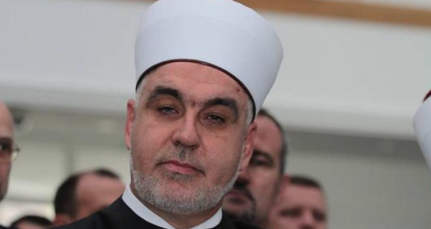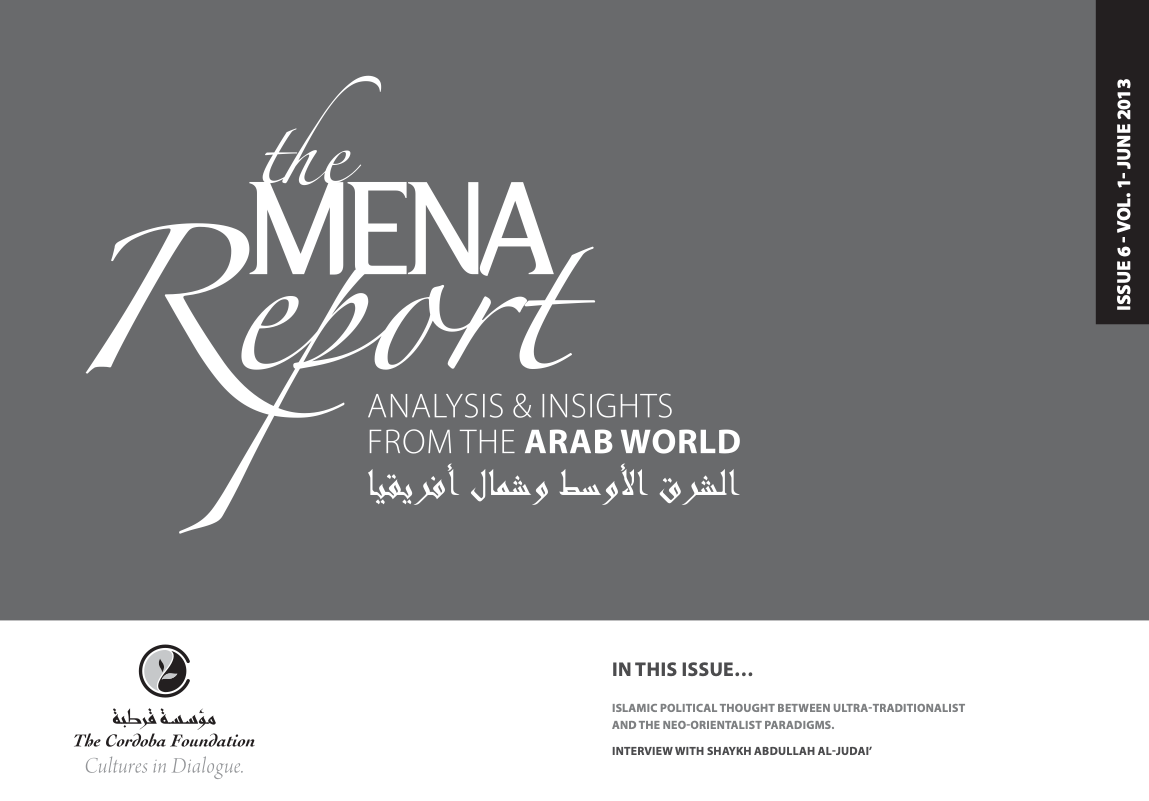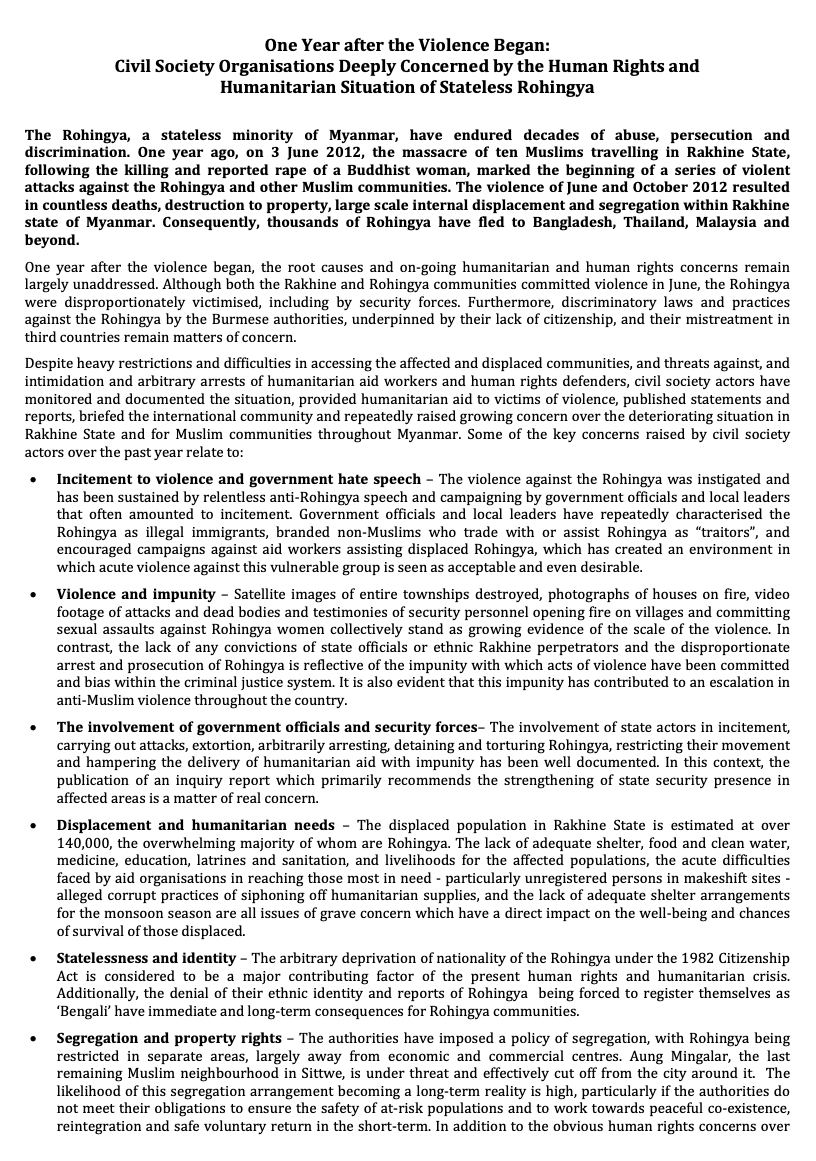
Jul 11, 2013 | News & Press
As thousands converge in Potocari today for the funeral prayers of over 400 bodies and the 18th anniversary of the Srebrenica genocide, we are once again reminded of the lengths that man could potentially go to when immersed in a state of fear, hatred and division
The Memorial Day puts to rest any naivety that the lessons of the past have not only been learned, but well and truly headed. Not only are human beings chronically capable of committing the most repugnant of acts against fellow human beings, regardless of the advancement of time, the catalysts for these crimes are invariably similar whatever the different and unique circumstances of each.
The Cordoba Foundation has been working tirelessly to raise awareness of the threat man poses against his fellow man, should particular conditions become established on the ground. Whether Srebrenica, Auswitz, Rwanda, Gaza, Kashmir, Myanmar or Somalia, and whether in the last century, this or the one coming, injustice establishes fear which breads suspicion and ultimately hatred. From there, the move on to violence is neither a difficult nor inconceivable step to undertake. Our objective is to work in common collaboration to remove the very initial elements on that tragic path, and to counter the root causes for clashes based on false and misguided understanding and implementation of the concepts of ‘self’ and ‘the other’.
The Srebrenica Memorial Day provides a timely reminder to us all of the challenges that can only be met in a sense of togetherness and community.

Jul 11, 2013 | News & Press
The Cordoba Foundation (TCF) has written to the US Secretary of State and the UK Foreign Secretary expressing concern about the events in Egypt
Dr Anas Altikriti, the CEO of TCF expressed concern that cirumventing people’s freedom and violating their human rights will only lead to violence, instability and antagonism towards the democratic values, we all share and aspire for all over the world.
THe Cordoba Foundation urges a moral and ethically weighted position from both the UK and the US in dealing with the situation in Egypt
To read the letter to the UK Foreign Secretary, please click here
letter_to_william_hague
To read th letter to the US Secretary of State, please click here
letter_to_john_kerrydq

Jul 9, 2013 | News & Press

Jul 9, 2013 | News & Press
On Wednesday 26th June at the Osmani Centre, London, The Cordoba Foundation launched the latest in a series of the Cordoba Papers, titled “Meet the Challenge, Make the Change – A Call to Action for Muslim Civil Society in Britain”.
 Authored by Dr. Muhammad Abdul Bari – a leading figure in the Muslim community – the paper attempts a critical look at the Muslim community, particularly in Britain and the role and performance of Islamic organisations.
Authored by Dr. Muhammad Abdul Bari – a leading figure in the Muslim community – the paper attempts a critical look at the Muslim community, particularly in Britain and the role and performance of Islamic organisations.
Providing a good mapping exercise, the paper charts a way forward through a bold and clear presentation but also raises interesting and pertinent issues for discussion and debate.
The publication was reviewed by writer and researcher, Dr Jamil Sherif and moderated by Dr Anas Altikriti, CEO of The Cordoba Foundation. In attendance were leading figures from Muslim organisations, charities, research institutions as well as community activists and youth. Dr Altikriti said “we welcome the open discussion and debate that took place during the launch of this timely publication, which is lacking in the community.”
In attendance were leading figures from Muslim organisations, charities, research institutions as well as community activists and youth. Dr Altikriti said “we welcome the open discussion and debate that took place during the launch of this timely publication, which is lacking in the community.”
Other discussants, including Dr Zahid Parvez – Rector of the Markfield Institute of Higher Education based at the Islamic Foundation in Leicestershire, pointed out the need for British Muslims to better engage with civil society on general interest issues. He said, “whilst we acknowledge a leadership-deficit in the Muslim community, new and credible leadership will emerge automatically in different spheres of our society.”
Lotifa Begum, Development Education Coordinator for Islamic Relief, commended Dr Abdul Bari for penning this paper and initiating discussion on this very important topic amongst stakeholders in the community”. Tarek el Diwany, consultant and analyst in the field of Islamic finance for Zest Advisory LLP, and author of The Problem With Interest, remarked that “we need to do away our fascination with labels and organisational bureaucracy and focus more on making real contribution to society, in the fields of media, medicine, finance and so on.”
 Responding to questions and points addressed to Dr Abdul Bari, he stressed that “overcoming cultural and religious differences is a priority to building a better future together with different stakeholders, as demonstrated in the life of Prophet Muhammad since the very beginning of the Revelation.”
Responding to questions and points addressed to Dr Abdul Bari, he stressed that “overcoming cultural and religious differences is a priority to building a better future together with different stakeholders, as demonstrated in the life of Prophet Muhammad since the very beginning of the Revelation.”
The Cordoba Foundation hopes that Dr Abdul Bari’s paper will inspire and probe those currently at key positions in the Muslim community to reflect on some of the issue and challenges highlighted but also to look forward to making the change for a better Muslim civil society in Britain.
The full publication can be downloaded from here


Jul 7, 2013 | Views
Only 29 months ago, Egyptians were united in celebrating the removal of Mubarak’s 30-year rule and the triumph of what seemed a glorious revolution that had inspired many around the world. This week, the Egyptian people, back on the streets in their many millions, were deeply divided almost down the middle over the question of legitimacy.
Mohammed Morsi, the first democratically elected president in the history of Egypt, stated in his last official speech that he would defend ‘legitimacy’ with his life. To his supporters and most neutral observers, he clearly meant defending the civil democratic elections, reflecting the will of the people in the face of an overriding military intervention. Without this the entire process would be defunct. To his opponents, it was a thinly-veiled threat and ultimatum threatening civil conflict, for which he lost all claim to his privileges to office.
To read more, please click here

Jun 26, 2013 | Reports
Aimed at European and Western readerships, the MENA Report aims to provide impartial, accurate and authoritative content and analysis, through The Cordoba Foundation’s unique access to rare and highly important primary sources in the Middle East and beyond
The MENA Report seeks to unpick and unravel some of this, and provide objective and strategic insights into events and developments in the region.
In this edition we have continued our investigation of the authenticity of religious, political and social sets of ideas, as well as traits which have been cast in stone and idealised. Lacking the ability or the will to distinguish between the sacred and the profane, the permissible and the absolute, inhibits the natural ability and will to investigate, reform and remedy.
TCF_MENA_JUNE_FINAL
Jun 24, 2013 | External Events
Jun 24, 2013 | Events
The Cordoba Foundation is supporting the Institute of Islamic Strategic & Socio-Political Affairs in a series of roundtables examining the Us-Afghan Withdrawal Program
The event will discuss the following questions:
What is the Pakistani army’s current and future Afghan policy and how does it impact upon the US withdrawal from Afghanistan and its aftermath?
The allegations towards the ISI: Facts, fictions, implications?
The Pakistani army and US army and intelligence relations?
What may be the new power structure in 2014 Afghan presidential elections and how will the Pashtun people be represented?
How will cross-border movements over the Durand line affect the post-2014 security situation?
What is the current state of play regarding armed groups (Haqqani network, LeJ, LeT, TTP, Al Qaeda etc.) in the Afghan-Pakistan borderlands?
In what way might we expect the dynamics of these armed groups operating in FATA to change following the Coalition’s withdrawal and the 2014 Afghan elections?
The event will be held on the 3rd of July and is by invitation only.
The event will be held under Chatham House Rules
Jun 24, 2013 | Events
This is a closed-door High-Level Roundtable on peace processes, conflict and humanitarian needs in Myanmar.
The event will be held on Tuesday, 2 July.
The roundtable aims to facilitate a high-level policy dialogue on three pressing interrelated issues: the ethnic peace process; the crisis in Rakhine State; and the Buddhist-Muslim violence in Myanmar and the wider ASEAN region. It will bring together government representatives, representatives of the donor community, policy-makers and humanitarian agencies currently involved in Myanmar.
This first section of this roundtable will seek to provide a forum to discuss the ongoing peace processes throughout Myanmar. Speakers, including Charles Petrie (Coordinator of the Myanmar Peace Support Initiative) will share progress made, but also the challenges that remain.
Rushanara Ali MP (Labour Member of Parliament for Bethnal Green and Bow and Shadow Minister for International Development) will speak on her recent visit to Rakhine State and her views on how the international community should respond to the crisis. Melanie Teff (Senior advocate, European representative, Refugees International) and Chris Lewa (Founder and coordinator, The Arakan Project) will then present their research findings and analysis on the situation in Rakhine State, followed by an in-depth discussion of possible strategies to address both the humanitarian crisis as well as the root causes of the conflict.
Finally, the roundtable will cover the spread of violence between Burmese Buddhists and Muslims in Myanmar and spill over into the wider region, particularly in Malaysia and Indonesia. Other speakers at the roundtable will include Oliver Lacey-Hall (Head, Regional Office for Asia and the Pacific at UN OCHA), Kyaw Win (Secretary of the Burmese Muslim Association) and Dr Jemilah Mahmood (ODI Council Member).
The meeting will be hosted by the Humanitarian Policy Group (HPG) and co-organised with Refugees International, Muslim Charities Forum and The Cordoba Foundation.
The discussion will be held under the Chatham House Rule and participation is by invitation only.
For more information, please click here

Jun 24, 2013 | News & Press
Today, the Equal Rights Trust, The Cordoba Foundation and 75 other civil society organisations issued a joint statement calling for an end to on-going human rights and humanitarian abuses against the stateless Rohingya in Rakhine state of Myanmar. The statement, which is simultaneously being issued by organisations on five continents and sent to the President of Myanmar and Myanmar embassies around the world, is an expression of global civil society solidarity regarding human rights protection of the Rohingya.
The Rohingya, a stateless minority of Myanmar, have endured decades of abuse, persecution and discrimination. One year ago, on 3 June 2012, the massacre of ten Muslims travelling in Rakhine State, following the killing and reported rape of a Buddhist woman, marked the beginning of a series of violent attacks against the Rohingya and other Muslim communities. The violence of June and October 2012 resulted in deaths, destruction to property, large scale internal displacement and segregation within Rakhine state of Myanmar. While up to 800 deaths resulting from the violence have been documented, it is believed that the actual number is in the thousands. The subsequent mass exodus has led to a rise of the numbers of Rohingya refugees fleeing to Bangladesh, Thailand, Malaysia and beyond.
One year after the violence began, its root causes, as well as on-going humanitarian and human rights concerns, remain largely unaddressed. Although both the Rakhine and Rohingya communities committed violence in June, the Rohingya were disproportionately victimised, including by security forces. Furthermore, discriminatory laws and practices against the Rohingya by the Burmese authorities, underpinned by their lack of citizenship, and their mistreatment in third countries, remain matters of concern.
The Joint Statement alerts the international community to several trends observed by civil society organisations over the past year, with regard to the crimes against humanity perpetrated by the Myanmar authorities; the lack of protection for Rohingya refugees and asylum seekers; the violence against the Rohingya and the impunity of perpetrators; the incitement to violence and government hate speech; the involvement of government officials and security forces; the displacement of the Rohingya; their urgent humanitarian needs; their statelessness; the segregation of the Rohingya and their property rights; the discriminatory restrictions on their family life and freedom of movement. The Joint Statement makes recommendations to the governments of Myanmar and refugee recipient countries and to the international community at large.
civil





 Authored by Dr. Muhammad Abdul Bari – a leading figure in the Muslim community – the paper attempts a critical look at the Muslim community, particularly in Britain and the role and performance of Islamic organisations.
Authored by Dr. Muhammad Abdul Bari – a leading figure in the Muslim community – the paper attempts a critical look at the Muslim community, particularly in Britain and the role and performance of Islamic organisations. In attendance were leading figures from Muslim organisations, charities, research institutions as well as community activists and youth. Dr Altikriti said “we welcome the open discussion and debate that took place during the launch of this timely publication, which is lacking in the community.”
In attendance were leading figures from Muslim organisations, charities, research institutions as well as community activists and youth. Dr Altikriti said “we welcome the open discussion and debate that took place during the launch of this timely publication, which is lacking in the community.” Responding to questions and points addressed to Dr Abdul Bari, he stressed that “overcoming cultural and religious differences is a priority to building a better future together with different stakeholders, as demonstrated in the life of Prophet Muhammad since the very beginning of the Revelation.”
Responding to questions and points addressed to Dr Abdul Bari, he stressed that “overcoming cultural and religious differences is a priority to building a better future together with different stakeholders, as demonstrated in the life of Prophet Muhammad since the very beginning of the Revelation.”




